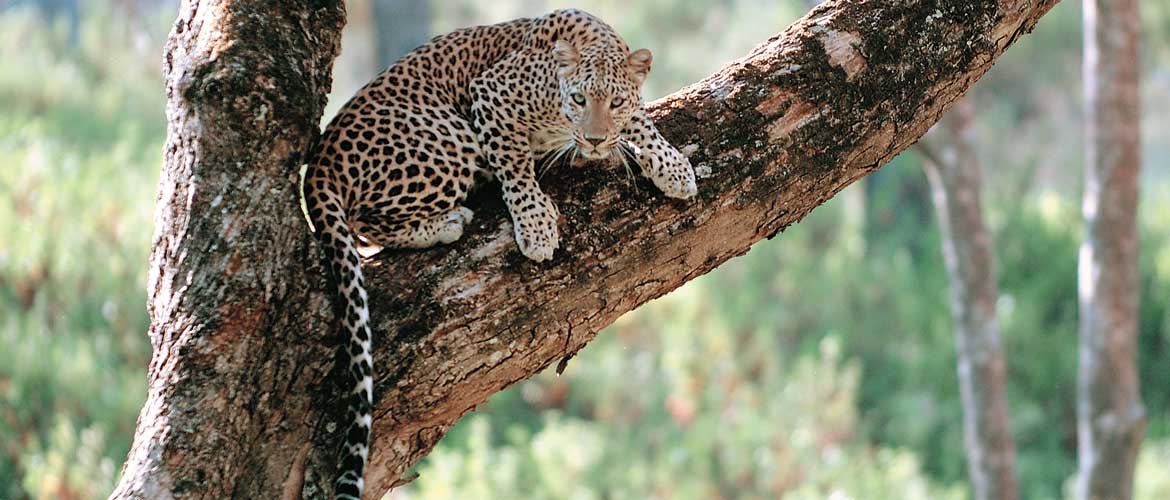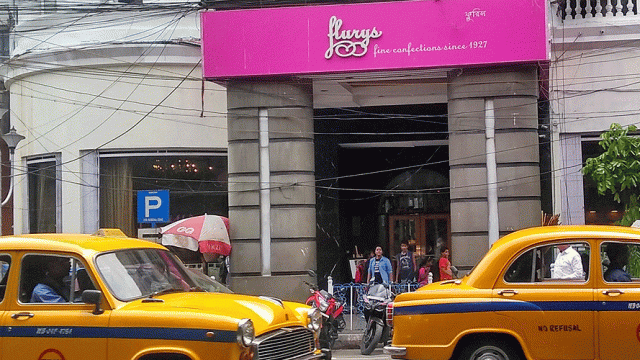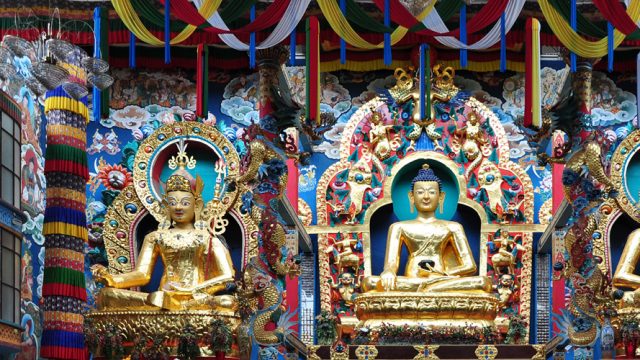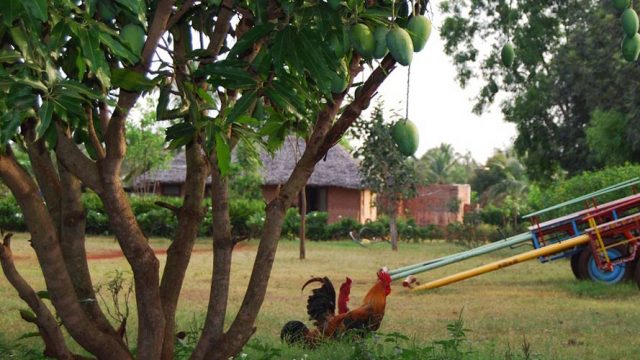The Biligiri Rangana Betta or BR Hills Wildlife Sanctuary, also known as the Biligiri Rangaswamy Temple Wildlife
This wildlife corridor witnesses some of the largest numbers of wild elephants and tigers east of the Western Ghats in the southern peninsular region. The forest is also home to gaur, dhole, giant flying squirrel and the endangered chou-singha (four-horned antelope).
In recent years, the sanctuary has been exposed to the ravages of quarrying along its fringe areas. Overgrazing is another threat that has to be handled effectively.
The two entry points to the sanctuary are Yelandur and Chamarajanagar, which are about 40km apart. The Chamarajanagar entry is about 40km from the sanctuary via the K Gudi Camp, while Yelandur is 18km from the sanctuary. The route is scenic from the Chamarajanagar side, with the road winding up the hill via Vandarbal village in the foothills. The forests are dense, the valleys deep, and they make for an enthralling sight. If you plan to halt at Chamarajanagar for the night, you need permission from the forest department. But if you are not staying back, make sure you are on your way out by 6.00pm sharp. The forest guards are pretty strict about the rule.

Apart from the tents put up by the K Gudi Camp run by Jungle Lodges, right next door is a forest rest house and the Jungle Lodges office located in the hunting lodge of the erstwhile Mysore royals.
Jeeps are available on hire at Chamarajanagar or Yelandur to travel to the sanctuary. Expect to pay ₹1,500 for a day trip from Chamarajanagar and about ₹ 800–1,000 from Yelandur.
Timings 6.00–9.00am; 4.00–6.00pm Vehicle fee ₹ 400 per day
Things to See & Do
The sanctuary is covered with thick jungles and a multitude of peaks rising and falling like the ebbs and tides in an ocean of greenery. Whether you choose to just soak in the goodness of nature or fold your hands in silent prayer at the temple, rest assured it will recharge your frazzled batteries and rejuvenate your senses.
Biligiri Rangaswamy Temple
The presiding deity of this temple is Lord Ranganatha, whose giant, 21-inch sandals are said to protect his feet as he wanders through these forests by night, keeping vigil. Said to be a few thousand years old, the temple is perched on a peak offering panoramic views of almost the entire region, and can be reached either on foot or vehicle. Right behind the temple is a spine-chilling 1,000-ft-drop into the dense jungle. Iron railings, installed for safety in recent times, still haven’t stopped the resident monkeys from performing acrobatics.
Dodda Sampige Mara
This is a mammoth champak (Magnolia champaka) tree deep inside the forest that is revered by locals. According to the Soliga tribals, Sage Agastya planted it some 3,000 years ago. The stream flowing nearby to where the tree stands is a sight to behold. Approach is only by jeep, as the terrain certainly doesn’t resemble your neighbourhood park!

Boodipadaga
Deep inside the sanctuary is a regal hunting lodge. Now slightly derelict, it was once a famous forest residence of the erstwhile Mysore rulers. This is where elephants used to be trapped by the pit method, and also where the scourge of the jungle, sandalwood smuggler and brigand Veerappan, was incarcerated for a few weeks in 1986. Today, it is the Forest Department Inspection Bungalow. Sloth bears and wild elephants often lurk around the lodge. Not too many visitors have returned from this part of the jungle without seeing at least one.
Ragikallu Madu
This is a unique natural formation not too far from Boodipadaga. The water from a stream forcefully gushes into a rocky depression (madu), creating a whorl, much like the movement of a stone grinder used to crush millet grains. Ragi means millet in Kannada and kallu means stone. Hence the name.
Trekking
The Boodipadaga area, like most parts of the BR Hills, offers the intrepid trekker enough mud for her boots. The place is ringed by hillocks and mounds clothed in lush jungles. Anna-Tamma Gudda, Sulare Gudda, Ittige Bare, Devara Betta, Jenkalbare, Malki Betta and Karadi Gadde are some of the spots that you can trek to. But not before you have the nod of the forest department and a tribal guide, without whom you are bound to lose your way.
Jungle Safari
Even if you are not fortunate enough to spot wildlife on the main road, the safari in the jungle that takes you on the Aane Hadu Road into the environs of the Basavananni Kere area deep inside, should give you ample scope to explore the wildlife and spot animals. The journey through the jungle is bound to be full of surprises as you could find an animal standing right in the middle of the game road as you bank a curve or go up an incline. Sightings happen around K Gudi Camp itself if you are lucky. Once a panther was seen just behind the dining area at about three in the afternoon, perched on a tree. Another time, a sloth bear came hurtling down a slope near a log hut as alarm calls rented the air. The time was nine in the morning. Although it is generally safe to hang around, there is always the possibility of such surprises springing upon you.
There is a pond within the Jungle Lodges campus that is frequented by wild elephants, especially during summer. A massive tusker is a particularly famous visitor, say the locals. There are two tame elephants in the camp, Kyateshwara and Jayalakshmi. It is Jayalakshmi on whose sturdy back you ride into the jungle. According to a recent survey, there are 17 tigers in this sanctuary. Besides, the sanctuary is home to other mammals such as gaur, sambar, chital and chousingha. Carnivores include the tiger, leopard, wild dog, lesser cats and sloth bear. Amongst arboreal mammals, two species of primates and three species of squirrels, including the giant flying squirrel, have been found. Surveys in the forest have recorded 254 species of birds, including the white-winged tit.
Where to Stay & Eat
Visitors have three options to choose from – a Jungle Lodges tented camp, and two forest rest houses located deep inside the sanctuary.
K Gudi Wilderness Camp (Bengaluru Tel: 080-40554055; Tariff: ₹ 6,616–7,538 per person, with meals and a few activities), the Jungle Lodges’ luxury-tented accommodation is full of rustic stylishness. It has eight permanent furnished twin-bed tents with modern toilet facilities. Three furnished ethnic huts on stilts (log huts) with attached modern toilet facilities are also available. Quaint hurricane lamps light up the night, as there is no electricity here. The Gol Ghar at the camp offers buffet breakfast, lunch and dinner along with coffee, tea and snacks.
The Forest Rest House (Tel: 222059; Tariff: ₹ 1,000) has four rooms and is run on solar power. Another FRH, located in K Gudi, has 4 rooms. The caretakers here can prepare your meals. Both FRHs can be booked through the office of the Conservator of Forests in Chamarajanagar (Tel: 08226-222059). You could also stay in Chamarajnagar. There are plenty of stay options available there.
Getting There
Air Nearest airport: Kempegowda International Airport, Bengaluru (235km/ 4.5hrs). Taxi to BR Hills costs around ₹ 3,500–4,000 (one way)
Rail Nearest railhead: Mysore Junction (104km/ 2hrs). Taxi from Mysore charges around ₹ 2,000
Road BR Hills is best accessed from Bengaluru via Mysore, Nanjangud, Chamarajnagar and K Gudi Camp. You can also go to BR Hills from Chamarajnagar via Nagavalli on SH81. KSRTC runs ordinary buses (₹ 200–220) at 7.00am, 9.00am, 12.30pm and 4.00pm to BR Hills from Bengaluru’s Satellite Bus Stand (Cell: 07760990530) on Mysore Road
Fast Facts
When to go September–April is the best time to visit. The sanctuary, however, is open throughout the year
Tourist/ Forest Department offices
Conservator of Forests
Wildlife Division, Sultan Sheriff Circle
Chamarajanagar
Tel: 08226-222059
KSTDC
Badami House, NR Square
Bengaluru. Tel: 080-43344334
Email: [email protected]
karnatakaholidays.net
Jungle Lodges & Resorts Ltd
Booking Office, 49, GF, Khanija Bhavan
Race Course Road, Bengaluru
Tel: 40554055
Email: [email protected]
junglelodges.com
Karnataka Forest Department
Bengaluru
Tel: 080-23343770
STD code Chamarajanagar 08226
State Karnataka
Location 3,375ft above sea level between the Cauvery and Kapila rivers in Chamarajanagar District, south of Bengaluru
Distance 221km S of Bengaluru
Route from Bengaluru NH209 to Chamarajanagar via Kanakapura, Malavalli and Shivanasamudram; state road to BR Hills
BR Hills Wildlife Sanctuary
Karnataka
OT Getaway Guides





